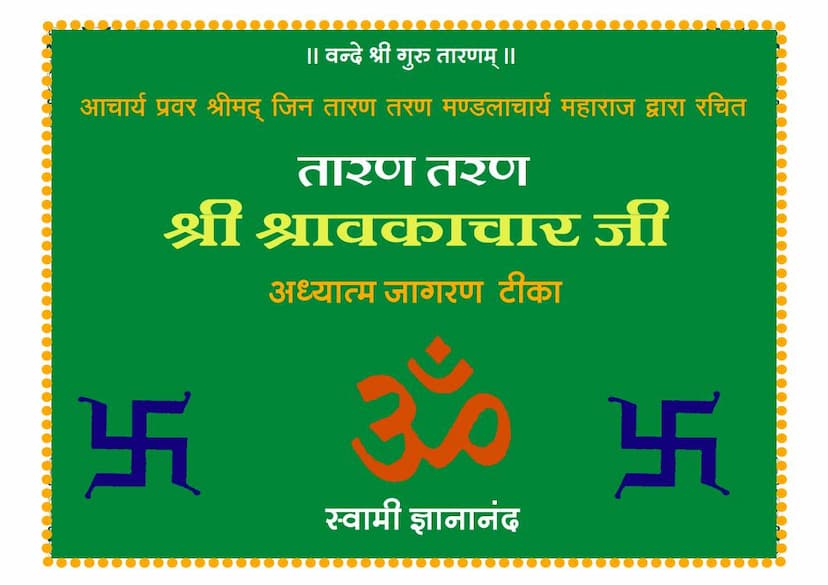Shravakachar
Added to library: September 2, 2025

Summary
This Jain text, "Shravakachar" by Gyanand Swami, published by Gokulchand Taran Sahitya Prakashan Jabalpur, is a commentary ("Adhyatma Jagran Tika") on the original work by Acharya Shrimad Jin Taran Taran Mandalacharya Ji Maharaj. The text, spanning over 200 pages, elaborates on the life and teachings of Taran Swami and provides a detailed guide for lay followers (Shravaks) seeking spiritual progress.
Key Themes and Content:
- Life and Teachings of Taran Swami: The text extensively praises Taran Swami, highlighting his spiritual awakening at a young age, his renunciation of worldly life, his prolific writing of fourteen spiritual texts, and his establishment of the Taran Panth. His mission was to guide souls towards liberation by emphasizing self-realization, detachment from worldly pleasures, and the practice of virtues like love, compassion, and non-violence. He is portrayed as a revolutionary spiritual leader who challenged religious rituals and advocated for a direct path to spirituality.
- The Role of the Shravak: The Shravakachar text, as interpreted and commented upon by Gyanand Swami, details the conduct and duties of a lay follower. It outlines the path to spiritual upliftment for householders, starting from their initial stages of faith (Avarati Samyagdarshan) and progressing through various vratas (vows) and practices.
- Core Jain Principles: The commentary emphasizes fundamental Jain tenets such as:
- Ahimsa (Non-violence): The text stresses the importance of Ahimsa in thought, word, and deed, extending it to all living beings, including microscopic organisms.
- Anekantavada (Non-absolutism): It highlights the Jain philosophy of viewing reality from multiple perspectives.
- Aparigraha (Non-possession): The text advocates for detachment from worldly possessions and desires.
- Ahimsa Paramodharma: The ultimate religion is Non-violence.
- Self-Realization: The core message is that the soul is inherently pure, omniscient, and blissful, and liberation comes from realizing this true nature, free from karma and delusion.
- Stages of Spiritual Progress (Shravak Pratimas): The text likely details the eleven Shravak Pratimas (stages of spiritual purity for lay followers) as a progressive path towards spiritual liberation, starting from Darshan Pratima (faith) to the highest stages of renunciation.
- Practices for Shravaks: The commentary includes guidance on daily conduct, ethical behavior, and spiritual practices for householders, such as:
- Shuddha Shaktkarma: The six essential daily duties, emphasizing purity in devotion to the divine, guru, scriptures, self-control, austerity, and charity. The text provides a detailed explanation of these, including their pure and impure aspects.
- Vratas and Anuvratas: The text elaborates on the five vows (Ahimsa, Satya, Asteya, Brahmacharya, Aparigraha) and their stricter forms (Mahavratas) followed by monks, and their diluted forms for lay followers. It also discusses the twelve additional vows (Vratas) and their importance.
- Virtuous Conduct: The commentary stresses the importance of virtues like righteousness, truthfulness, non-stealing, celibacy, non-possession, compassion, forgiveness, and contentment.
- Charitable Acts (Dana): The text emphasizes the significance of charity (Dana) and categorizes the recipients (Pātra) into four types: learned scholars, the sick, the helpless, and those seeking knowledge. The importance of selfless and devotional giving is highlighted.
- Mindfulness and Meditation (Dhyana): The text describes various forms of meditation, including Padmasana, Padmastha, Hiranyagarbha, and the importance of controlling the mind and senses.
- Ethical Living: It covers ethical conduct in daily life, including diet, behavior, and social interactions, discouraging harmful practices and superstitions.
- Commentary Style: The commentary, "Adhyatma Jagran Tika" by Gyanand Swami, aims to simplify the complex original texts of Taran Swami, making them accessible to a wider audience in a clear and profound manner. It is praised for its spiritual depth and ability to awaken spiritual consciousness.
Structure and Tone:
The text is structured with an introduction, editorial notes, a donor list, and a detailed index of subjects covered. The tone is deeply reverent towards Taran Swami and Gyanand Swami, portraying their teachings as spiritually awakening and essential for liberation. The language is devotional and inspirational, aiming to guide the reader towards self-realization and spiritual well-being.
Overall Significance:
"Shravakachar" by Gyanand Swami serves as a vital spiritual manual for Jain householders, especially those following the Taran Panth tradition. It provides a comprehensive roadmap for spiritual practice within a householder's life, emphasizing that true spirituality lies in inner transformation and the realization of the soul's true nature, rather than mere external rituals. The commentary makes Taran Swami's profound teachings accessible, fostering spiritual awakening and guiding individuals towards liberation.